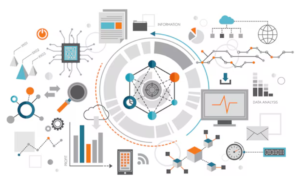Introduction
A Management Information System (MIS) is a structured system that collects, processes, and provides critical data to help managers and business leaders make informed decisions. It integrates technology, people, and processes to streamline operations, improve efficiency, and support strategic planning.

Key Features
Data Collection and Processing
MIS gathers and processes data from various sources, turning raw information into actionable insights that support decision-making.
Real-time Information Access
MIS provides real-time access to critical business data, allowing managers to make timely and informed decisions.
Enhanced Decision-Making
By offering accurate and up-to-date information, MIS helps managers evaluate business performance and make strategic decisions.
Integration of Business Functions
MIS integrates various business functions—such as finance, operations, and human resources—into a single system for smoother coordination and communication.
Reporting and Analytics
MIS generates detailed reports and analytics, allowing managers to assess trends, track performance, and predict future outcomes.
Increased Efficiency
Automating data processing and providing streamlined information access, MIS increases overall operational efficiency and reduces manual effort.
FAQs
1. What is a Management Information System (MIS)?
MIS is a system that collects, processes, and delivers essential business data to help managers make informed decisions.
2. How does MIS improve decision-making?
It provides accurate, real-time data and analysis, helping managers evaluate performance and make well-informed strategic choices.
3. What types of data can MIS handle?
MIS can process data related to finance, operations, sales, human resources, and more, offering a comprehensive view of business activities.
4. How does MIS increase operational efficiency?
By automating data collection and processing, MIS reduces the need for manual tasks, saving time and improving workflow.
5. Can MIS generate business reports?
Yes, MIS provides detailed reports and analytics, helping businesses track performance and analyze trends for better planning.
6. Is MIS customizable for different industries?
Yes, MIS can be tailored to the specific needs of different industries, offering specialized features and reports based on business requirements.
